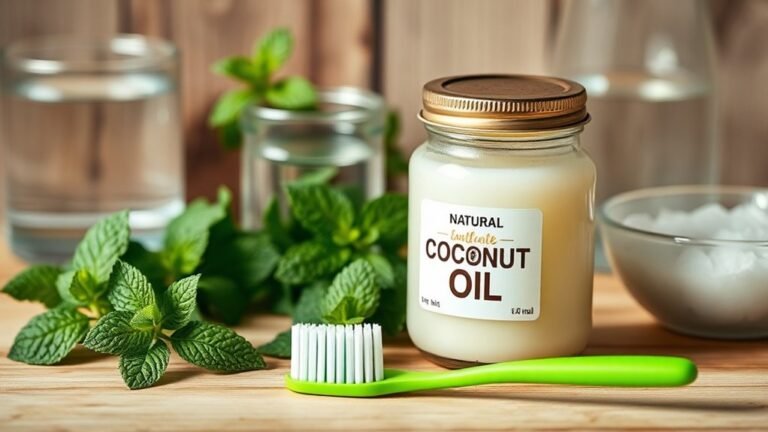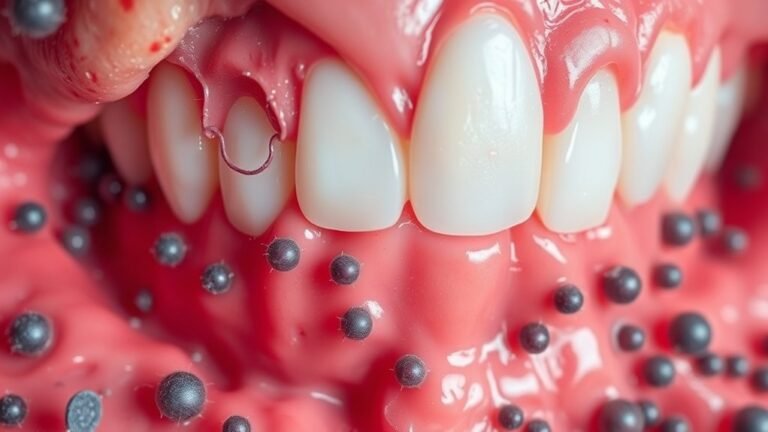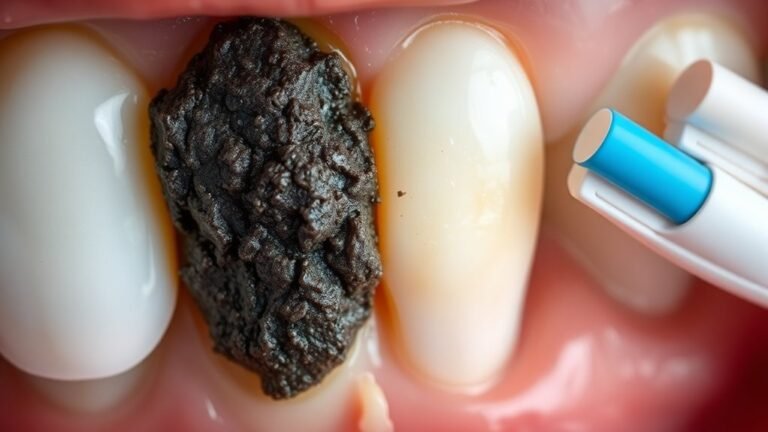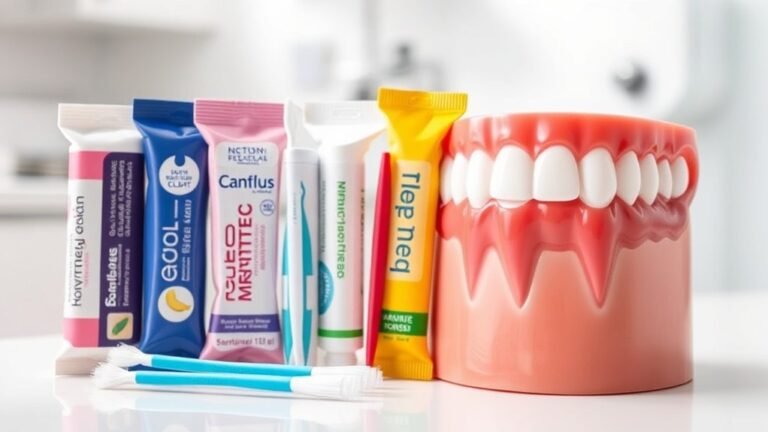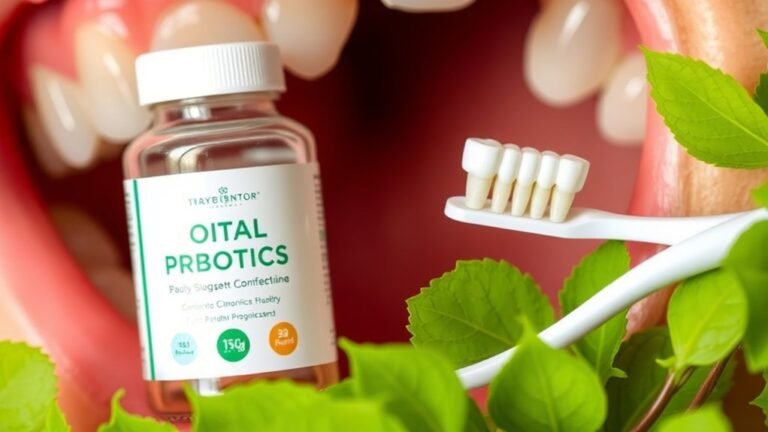Effective Daily Oral Care Products Help Maintain Inflammation-Free Gums
To maintain inflammation-free gums, you need effective daily oral care products. Choose a fluoride toothpaste with anti-inflammatory ingredients, such as aloe vera. Incorporate a mouthwash designed specifically for gum health, which fights bacteria and protects against plaque. Floss daily with proper techniques to remove debris between teeth and rinse afterward with an antimicrobial mouthwash to boost your routine. Regular dental check-ups are essential too. Discover more tips and techniques for ideal gum health in your oral care routine.
Key Takeaways
- Choose fluoride toothpaste with anti-inflammatory ingredients like aloe vera to combat plaque and support gum health.
- Use an ADA-approved mouthwash specifically designed for gum care to target harmful bacteria and strengthen gum tissue.
- Incorporate gentle flossing techniques to effectively remove food particles and plaque between teeth without damaging gum tissue.
- Schedule regular dental check-ups for professional plaque and tartar removal, ensuring early detection of gum inflammation.
- Maintain a consistent oral hygiene routine, including brushing twice daily and flossing, to prevent gum inflammation and promote overall health.
Understanding Gum Health and Inflammation
While you may not think about your gums often, understanding their health is vital for your overall well-being. Gum inflammation, often a sign of gingivitis, can lead to more serious dental issues if left untreated. When plaque builds up on your teeth, it irritates the gums, causing swelling and discomfort. Practicing good oral hygiene is essential in preventing these problems. Regular brushing and flossing help remove plaque and food particles, minimizing the risk of gum disease. Additionally, routine dental check-ups allow professionals to detect early signs of inflammation. By prioritizing your gum health, you not only maintain a beautiful smile but also contribute to your overall health. Remember, healthy gums are the foundation of a healthy mouth.
The Importance of Choosing the Right Toothpaste
Choosing the right toothpaste is essential for maintaining gum health and preventing inflammation. A suitable toothpaste not only helps combat tooth decay but also supports inflammation control, reducing the risk of bleeding gums.
When selecting a toothpaste, consider the following factors:
- Fluoride content: Helps prevent tooth decay by strengthening enamel.
- Anti-inflammatory ingredients: Look for options with natural extracts like aloe vera or tea tree oil.
- Sensitivity protection: If you experience sensitivity, choose a formula designed for sensitive teeth.
- ADA Seal of Acceptance: Verify the toothpaste meets the American Dental Association’s standards for safety and effectiveness.
Mouthwash: A Key Component for Gum Care
Mouthwash plays an essential role in maintaining gum health and preventing periodontal issues. Incorporating an effective mouthwash into your daily routine can greatly reduce gum inflammation and promote gum healing. Many formulations contain antibacterial agents that target harmful bacteria, helping to keep your mouth fresh and your gums healthy. When you swish mouthwash after brushing and flossing, you create an additional barrier against plaque buildup and tartar formation. Opt for a mouthwash specifically designed for gum care, as these products often contain ingredients that support gum tissue strength. Remember, while mouthwash is a powerful tool, it should complement, not replace, your regular oral hygiene practices. Prioritizing this step will lead to a healthier mouth and a reduced risk of gum disease.
Flossing Techniques for Optimal Gum Health
Flossing is an essential practice for maintaining ideal gum health, as it effectively removes plaque and food particles from between your teeth where a toothbrush can’t reach. Proper flossing techniques can considerably impact your gum tissue and reduce gum sensitivity. Here are some effective techniques to enhance your oral care routine:
- Use about 18 inches of dental floss, wrapping it around your fingers.
- Gently slide the floss between your teeth, curving it against the tooth surface.
- Avoid snapping the floss, as it may injure your gum tissue.
- Rinse with an antimicrobial mouthwash after flossing to maximize the effects of your oral care products.
Incorporating these techniques will help you achieve healthier gums and prevent inflammation.
Gum-Friendly Foods and Their Benefits
Maintaining healthy gums goes beyond just good oral hygiene practices like flossing; your diet plays a significant role too. Incorporating gum-friendly foods can help reduce gum irritation and support overall gum health. A balanced diet rich in vitamins and minerals strengthens your gums and teeth. Natural supplements, such as omega-3 fatty acids and vitamin C, can further enhance your gum health.
| Food Category | Benefits | Examples |
|---|---|---|
| Fruits & Veggies | High in antioxidants | Strawberries, spinach |
| Dairy Products | Rich in calcium | Yogurt, cheese |
| Whole Grains | Supports overall health | Oats, quinoa |
| Nuts & Seeds | Anti-inflammatory properties | Walnuts, chia seeds |
| Fish | Omega-3 fatty acids | Salmon, sardines |
Make these foods part of your diet for healthier gums!
The Role of Regular Dental Check-Ups
Regular dental check-ups are essential for maintaining healthy gums and preventing issues before they arise. During these visits, your dentist can identify early signs of gum disease, allowing for timely intervention. By prioritizing preventive care, you can guarantee your oral health remains in top shape.
Importance of Preventive Care
While you may brush your teeth diligently at home, nothing replaces the value of regular dental check-ups in maintaining healthy gums. These appointments are key to preventive care, helping you stay ahead of potential issues, such as periodontal disease. During a check-up, your dentist can:
- Identify early signs of gum disease
- Remove plaque and tartar buildup
- Assess your overall oral health
- Provide personalized care recommendations
Identifying Gum Disease Early
To successfully identify gum disease early, routine dental check-ups play a crucial role in your oral health. During these visits, your dentist can detect early signs of gum infection, such as gingival bleeding and inflammation, which you might overlook at home. Regular examinations allow for timely interventions, preventing the progression of gum disease and maintaining inflammation-free gums. Your dentist will assess your gum health, measuring pocket depths and evaluating your overall oral hygiene. By prioritizing these appointments, you not only safeguard your gums but also enhance your overall well-being. Remember, early detection is key; the sooner you address any issues, the better your chances of preserving your smile and avoiding more severe dental problems down the road.
Tips for Maintaining Consistent Oral Care Routines
Establishing a consistent oral care routine can feel like an intimidating task, but it’s essential for maintaining healthy gums. Proper dental care helps prevent gum swelling and enhances overall oral health. Here are some tips to keep your routine on track:
A consistent oral care routine is vital for healthy gums and overall oral health.
- Set a schedule: Brush twice a day and floss daily at the same times.
- Use quality products: Choose fluoride toothpaste and effective mouthwash. Consider oral probiotics to support gum health.
- Stay motivated: Track your progress or use reminders to stay accountable.
- Visit your dentist regularly: Professional cleanings are crucial for preventing gum disease.
Frequently Asked Questions
Can Certain Medications Affect Gum Inflammation Levels?
Yes, certain medications can affect gum inflammation levels. For instance, some antihypertensives and anticonvulsants may cause gum overgrowth, while others can lead to dryness, impacting your oral health and increasing inflammation risk. Regular monitoring’s essential.
How Often Should I Replace My Toothbrush?
You should replace your toothbrush every three to four months, or sooner if the bristles become frayed. A fresh brush helps guarantee effective cleaning, reducing plaque buildup and promoting healthier gums for your overall oral health.
Are Electric Toothbrushes Better for Gum Health?
Yes, electric toothbrushes can be better for gum health. They often provide consistent pressure and superior plaque removal, which can reduce gum inflammation. Just guarantee you use the proper technique and replace brush heads regularly.
What Are the Signs of Gum Disease?
Gum disease creeps in like a shadow. You might notice swollen gums, persistent bad breath, bleeding during brushing, or gum recession. If you spot these signs, it’s essential to consult your dentist promptly for evaluation.
Can Stress Impact Gum Health?
Yes, stress can negatively impact your gum health. It weakens your immune response, making you more susceptible to gum disease. Managing stress through relaxation techniques can help maintain healthier gums and overall oral health.
Conclusion
By combining effective daily oral care products with a consistent routine, you can markedly reduce gum inflammation. Imagine reaching for that toothpaste that fights bacteria while savoring gum-friendly snacks that nourish your gums. Don’t forget the invigorating mouthwash and those flossing techniques that seem simple but work wonders. Regular dental check-ups will further enhance your efforts. Embrace these practices, and you’ll find yourself with healthier gums, leading to a brighter smile and overall well-being.

